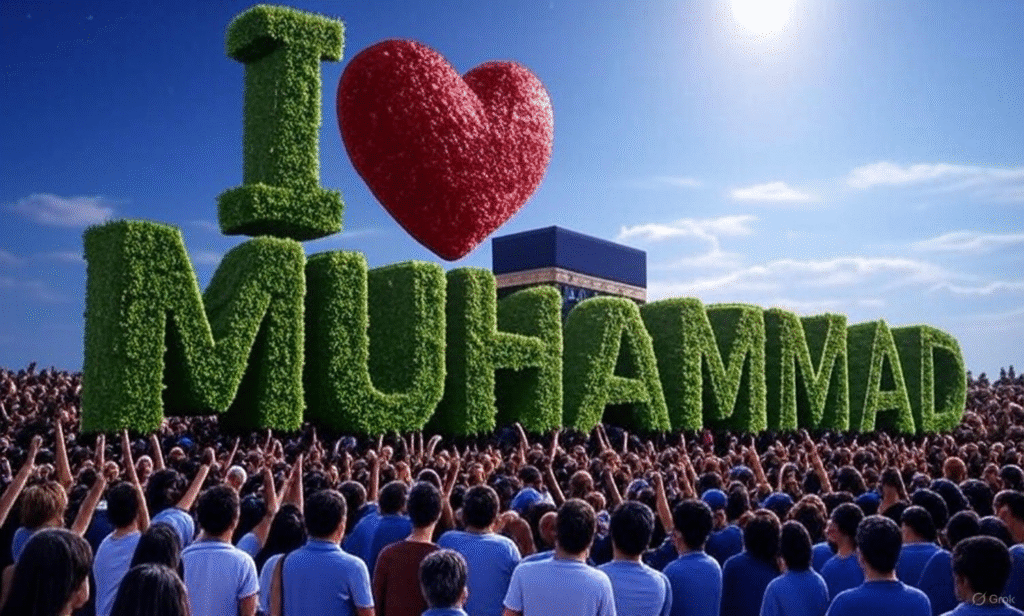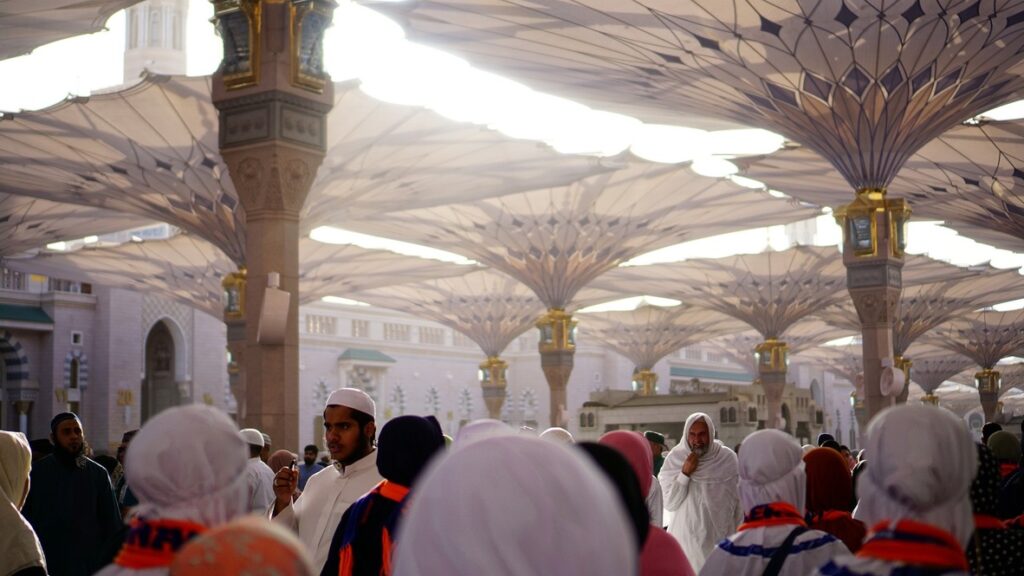
A Testament of Faith and a Message of Universal Love
I Love Muhammad: In a world often fractured by difference, the simple, heartfelt declaration, “I Love Muhammad,” has been tragically misconstrued. To millions of Muslims around the globe, and within India’s rich tapestry of faith, this statement is not a provocation but a core tenet of their belief—a peaceful affirmation of devotion to a man they revere as the ultimate embodiment of mercy, compassion, and justice. To reduce this profound spiritual connection to a point of conflict is to misunderstand the very essence of the Islamic faith. There is absolutely nothing wrong with this slogan; it is a message of love, and here is why.
For a Muslim, loving the Prophet Muhammad (pbuh) is as natural as breathing. It is not a political statement but a spiritual imperative, rooted in the Quran itself and flowing from the example of his life. This love is not a blind obsession but a reasoned, deeply felt gratitude for a guide who brought humanity out of darkness and into the light of God’s message.
Table of Contents
The Foundation: Love for the Messenger
The primary reason for this love begins with God. Muslims love God, the Creator, above all else. The Quran, which Muslims believe is the literal word of God, was revealed to humanity through the Prophet Muhammad (pbuh). He was the chosen vessel who delivered this guidance, endured persecution for it, and then spent his life exemplifying its teachings. Therefore, to love the Messenger is to love the message he brought—a message of the oneness of God, of accountability, and of compassion.
The Quran explicitly speaks of the Prophet’s elevated status and the bond he shares with believers: “The Prophet is more worthy of the believers than themselves, and his wives are their mothers.” (Quran 33:6). This verse establishes a relationship that transcends mere leadership; it is a bond of kinship and deep spiritual affinity. To love him is to acknowledge this God-ordained connection.
The Man of Mercy: A Beacon for All Humanity
I Love Muhammad: The love for Muhammad (pbuh) is rooted in his character. He was not a distant deity but a human being—a man known, even before his prophethood, as “Al-Amin,” the Trustworthy. His life provides a complete model for how to live with integrity, empathy, and justice.
1. The Mercy to the Worlds:
The Quran describes him as “a mercy to the worlds.” (Quran 21:107). This mercy was not exclusive. His life is filled with examples of compassion that defy the tribal norms of 7th-century Arabia. He ensured the rights of the poor, elevated the status of women by outlawing female infanticide and granting them inheritance rights, and preached kindness to orphans and slaves. He taught that smiling at your brother is charity and that removing a harmful object from the road is an act of faith. The result is not the legacy of a man to be feared, but one to be loved.
2. The Paragon of Forgiveness:
Perhaps the most powerful testament to his character is his capacity for forgiveness. After years of persecution in Mecca, he returned to the city as a conqueror. Instead of seeking revenge, he faced his former tormentors and asked, “What do you think I will do with you?” When they remained silent in fear, he proclaimed, “No blame will there be upon you today. God will forgive you, and He is the most merciful of the merciful.” This act of supreme mercy, which prevented a bloodbath, is a cornerstone of his legacy. Everyone loves such a man.
3. The Advocate for Justice:
His love for justice was absolute. He famously said, “Even if my daughter Fatima (RA) were to steal, I would cut off her hand.” He established a society where an individual’s worth was measured by their piety and character, not by their tribe, race, or wealth. In a world still grappling with inequality, his dedication to justice remains a powerful inspiration.
A Love That Inspires Goodness
The love for Prophet Muhammad (pbuh) is not a passive emotion; it is an active force that inspires believers to become better people. To love him is to strive to emulate his kindness, his honesty, his patience, and his generosity. When a Muslim says, “I love Muhammad,” they are essentially saying:
- “I aspire to be truthful, because he was the Trustworthy.”
- “I will be compassionate to the poor and the marginalized, because he was.”
- “I will stand for justice, even if it is against my own interests, because he did.”
- “I will forgive those who wrong me, because he forgave his greatest enemies.”
This love is a moral compass. It is a commitment to living a life of virtue, in homage to the one who showed them the way.
Conclusion: I Love Muhammad–A Declaration of Peace, Not Provocation
In the current climate, where identities are politicized and faiths are pitted against one another, it is crucial to return to the essence of such declarations. “I Love Muhammad” (pbuh) is a personal, spiritual affirmation. It is as valid and as peaceful as a devotee saying “I love Rama,” or “I love Jesus,” or “I love Krishna.”
The protests that seek to criminalize this expression of love are not just an attack on free speech; they are an assault on the very heart of a Muslim’s faith. They demand that Muslims silence their devotion in the public sphere, creating a hierarchy where one expression of love is deemed acceptable while another is branded as offensive. This is fundamentally at odds with the pluralistic spirit of India, a land that has historically given space to a multitude of faiths.
The message of “I Love Muhammad”(pbuh) is, at its core, a message of love. It is a love that calls for mercy, justice, and compassion—values that are universal and desperately needed today. To understand this is to move beyond prejudice and see the statement for what it truly is: a peaceful testament of faith, a tribute to a man who changed the world for the better, and a reminder that love for a spiritual guide can be a powerful force for good in a troubled world. There is absolutely nothing wrong with that.
FAQ: “I Love Muhammad” – A Testament of Faith
Q1: Why is the phrase “I Love Muhammad” so important to Muslims? Isn’t it enough to believe in God?
A Muslim’s love for God and their love for Prophet Muhammad go hand in hand. People see him as the last messenger because he brought God’s full instructions (the Quran) and lived a perfect life that followed its teachings. In light of this, showing love and respect for him is the best way to honor the lesson he brought and live by it. The tie is spiritual and based on thanksgiving and respect.
Q2: The article mentions the Prophet’s forgiveness and mercy. But isn’t there a history of violence in early Islamic history?
A: Prophet Muhammad’s life was full of defensive fights and political problems, just like the lives of all important historical figures who built a state and a community. The piece, on the other hand, is mostly about the moral lessons he taught and lived by, which Muslims are told to follow. His forgiveness of the people of Mecca after taking it over is a major event in history that shows how he put kindness over revenge, which is a core idea for believers that remains a part of his legacy.
Q3: If this love is so peaceful, why did it spark protests in India?
The protests weren’t against the religious idea itself; they were against how it was misunderstood in a certain political and social setting. The story says that some groups got the meaning of the declaration wrong when they saw it as an angry response or an attempt to convert people in a sensitive setting. The protests weren’t so much about the words themselves as they were about what people saw as a threat to the power of the majority in public places. This brought to light political tensions that were already there.
Q4: What is the key takeaway for non-Muslims reading this article?
The most important thing to remember is that “I Love Muhammad” is a spiritual statement for Muslims first and foremost. This statement is meant to encourage people to be good—to be merciful, fair, and honest—not to be hostile. Similar to religious statements in other religions, seeing it as a sign of strong faith and a commitment to living an ethical life is a key step toward respecting each other and ending pointless arguments.
Q5 : Does this mean Muslims should be able to express this love anywhere, without considering the feelings of others?
In a pluralistic society, the piece makes the case for the right to peacefully express one’s faith. It tells the difference between properly stating your own beliefs and insulting the beliefs of others on purpose. People see the words “I Love Muhammad” as the first type, which is an individual declaration of love. According to the concept of mutual respect, everyone should be able to freely express their religious beliefs as long as it’s not done with bad intentions or to put others down.
General Disclaimer
“Some images on this blog are AI-generated. They are used for creative purposes and do not represent real photographs.”

